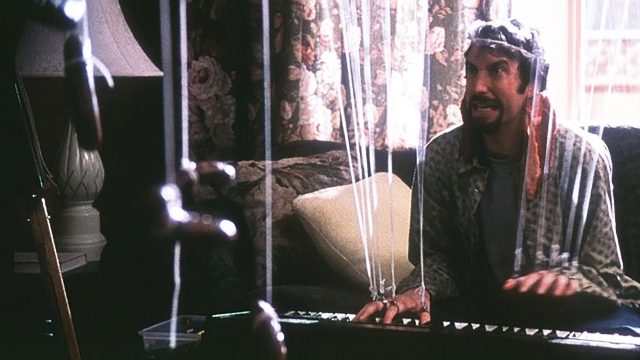Tom Green was cursed with being ahead of his time. His self-titled MTV show drew vitriolic reviews at the time, being called one of the 50 worst shows of all time by TV Guide in 2002. The show, which centered around Green performing stunts such as painting pornography on the hood of his dad’s car and using the intercom at a department store to broadcast bizarre statements, is by no means high art. But looking closely at his sketches reveals an almost sociological exploration of how people will behave when confronted with bizarre behavior, and his show’s willingness to turn the public into the straight man for his antics has raised his show’s respectability over time. Indeed, while they might not have been directly influenced by Green, it’s easy to see media such as Borat, Jackass, and Nathan For You as falling into a style of comedy Green helped popularize.
Likewise, Freddy Got Fingered, Green’s sole foray into directing, was released 20 years ago to reviews calling it one of the worst movies of all time, coupled with a dismal box office performance that all but killed Green’s career. Roger Ebert, in one of his most famous pans, wrote, “This movie doesn’t scrape the bottom of the barrel. This movie isn’t the bottom of the barrel. This movie isn’t below the bottom of the barrel. This movie doesn’t deserve to be mentioned in the same sentence with barrels.” The movie won five Razzies including Worst Picture, and Green gamely showed up to collect his awards, bringing his own red carpet and playing the harmonica poorly until he was dragged off the stage.
It is exceedingly easy to see why the film gathered such a negative reaction. If the opening shot of Green’s Gord in his bed giggling psychotically to his drawings, as if enjoying a private joke only he understands, didn’t drive audiences away, then a scene five minutes later where Gord pulls over and grabs a horse’s penis certainly would have done the trick. Sprinkled throughout are various gross-out setpieces that function as the ne plus ultra of Farrelly Brothers-style comedy so prevalent at the time: Gord delivers a baby, chews through the umbilical cord, and swings the baby around, spraying the room with blood and viscera in a scene as horrifying as it is hilarious. Gord’s friend Darren (Harland Williams) suffers a compound fracture on a skate ramp, which Gord proceeds to lick. And that’s saying nothing of what happens to Gord’s young neighbor Andy (Connor Widdows), a child who suffers increasingly gory injuries throughout the film before being chopped up by plane propellers in the movie’s final minutes. With such a massive amount of disgusting humor, the film seemed predestined for failure.
At the same time, it’s exactly these elements that helped the film find an audience in later years. Film critic Nathan Rabin’s seminal My Year of Flops piece on the movie helped popularize a growing sentiment at the time that the film was meant more as Godardian surrealism than as gross-out comedy. Green isn’t much of a visual stylist, but he has a smattering of shot choices (such as the aforementioned shot of Gord in his bed laughing, a spiraling zoom-out that makes him seem deeply disturbed) that enhance the film’s outsider-art charm. And perhaps the movie’s single greatest coup was casting Rip Torn as Gord’s perpetually apoplectic father. Movies about comic irritants thrive on palpable tension (think of how the contentious relationship between Richard Dreyfus and Bill Murray that helps fuel What About Bob?), and having the volatile Torn (a man whose defense against charges that he tried to kill Dennis Hopper was to show video evidence that he was trying to kill literary giant Norman Mailer at the time the assault on Hopper was alleged to have happened) play a man increasingly exasperated by his son’s antics gives the film a genuine sense of danger.
What also helped the film’s reputation is a sneaky sense that Green wasn’t just trying to make the most extreme comedy imaginable. Throughout the film, there’s an element of satire in its portrayal of American success. Gord moves to Los Angeles to become an animator but finds himself working a banal job in a cheese sandwich factory, eventually finding himself forced to move back home. His brother Freddy (Eddie Kaye Thomas) looks down on him for not having a job, but Gord correctly points out that Freddy hates his job, lives in a crappy house, and has to come over for breakfast because he can’t afford food of his own. When Gord pretends to be a high-powered businessman calling a fake underling on a date with love interest Betty (Marisa Coughlan), he comes across more as an abusive jerk than a powerful Master of the Universe type. And even when Gord succeeds as an animator, it’s more due to luck than any sort of hard work. The series he creates, Zebras in America, reflects the Canadian Green’s view of cutthroat American success. The satire is more sledgehammer than scalpel, but it is prevalent.
Twenty years on, Freddy Got Fingered remains a divisive film. But its reputation has been enhanced by its unique place in comedy filmmaking. There simply hasn’t been a film this brazen in the years since. Even Ebert, writing about the forgotten Jason Lee vehicle Stealing Harvard (which costarred Green), revised his opinion a little, stating that part of him respected Green’s passion and willingness to go as far as he did in this movie. And while there hasn’t been a movie like Freddy Got Fingered since, it’s easy to see its influence in everything from Hot Rod (with which it shares a basic broad-strokes story about a son becoming a success solely to stick it to his hated father) to I Think You Should Leave. Time has been kind to Green’s vision, even if we will forever wait in vain for a second directorial effort.

